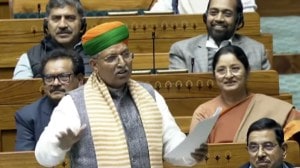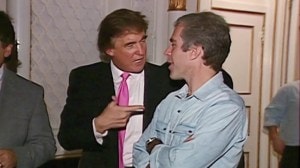Why Iran reopening its embassy in Saudi Arabia is a big deal
Iran has reopened its embassy in Saudi Arabia after seven years. This comes following a China-brokered deal between the two historical rivals in March, which eased tensions and set the stage for a major realignment in the region.
 Alireza Bigdeli, Iran's Deputy Foreign Minister for Consular Affairs, speaks as Saudi Ali al-Youssef, Director of Consular Affairs at the Ministry of Foreign Affairs and Hassan Zarnegar, Charge of consular affairs in the Iranian embassy, look on during a ceremony for the reopening of the Iranian Embassy in Riyadh, Saudi Arabia, June 6, 2023. (Photo: REUTERS/Ahmed Yosri)
Alireza Bigdeli, Iran's Deputy Foreign Minister for Consular Affairs, speaks as Saudi Ali al-Youssef, Director of Consular Affairs at the Ministry of Foreign Affairs and Hassan Zarnegar, Charge of consular affairs in the Iranian embassy, look on during a ceremony for the reopening of the Iranian Embassy in Riyadh, Saudi Arabia, June 6, 2023. (Photo: REUTERS/Ahmed Yosri) Iran officially reopened its embassy in Saudi Arabia on Tuesday (June 6), following a deal to re-establish ties and ease a long rivalry that fuelled conflicts across West Asia.
The diplomatic mission was opened after a seven year hiatus, during which the two countries have often found themselves at loggerheads.
“We consider today an important day in the relations between Islamic Republic of Iran and Saudi Arabia,” Iran’s Deputy Foreign Minister for Consular Affairs Alireza Bikdeli said in a speech during the opening ceremony at the embassy compound.
“The region will move Inshallah (God willing) towards greater cooperation and convergence to achieve stability, prosperity and progress,” Bikdeli said.
Restoring diplomatic ties
This comes after the two countries announced the restoration of diplomatic ties on March 9, with China acting as peace-broker.
Under the agreement which was announced, Iran and Saudi Arabia agreed to patch up a seven-year split by reviving a security cooperation pact, reopening embassies in each other’s countries within two months, and resuming trade, investment and cultural accords.
Saudi Arabia is yet to open its embassy in Tehran, but an announcement on that is expected soon.
China and a realignment in West Asia
As per experts, the thaw in Iran-Saudi Arabia relations has major implications in West Asian geopolitics, especially in context of the role played by China.
China was clearly “proactive” in pursuing an “achievement” in a region dominated by US influence. Beijing, new to international peace-making, sensed what observers have described as a “low risk, high impact” opportunity to establish its diplomatic and political credentials in West Asia, a region where it has high economic stakes.
It is significant that China is a signatory to the deal, called “joint trilateral statement”, projecting itself almost as a guarantor of the terms: resumption of diplomatic relations and reopening embassies and missions within two months; respect for the sovereignty of states and the non-interference in internal affairs of states; agreement to implement the Security Cooperation Agreement of April 2001, and the May 1998 General Agreement for Cooperation in the Fields of Economy, Trade, Investment, Technology, Science, Culture, Sports, and Youth.
China’s role is said to have begun in December 2022, during Xi’s visit to Riyadh, where the Saudis requested Beijing’s facilitation, frustrated that five rounds of talks hosted by Baghdad since 2021 and attempts by Oman had reached a dead end. In February 2023, Iranian Prime Minister Ebrahim Raisi visited China and met Xi. The negotiations that began after this culminated in the signing on March 9.
Both Iran and Saudi Arabia had compelling reasons to restore relations
Notably, both Saudi Arabia and Iran had compelling reasons to sign a deal.
For Saudi, the frosty relations with the Biden Administration; the absence of American security guarantees against Iran as made clear by the Trump administration after the Houthis successfully targeted its oil facilities in 2019; and China’s rising profile in West Asia at a time of lowering American engagement in the region.
For Iran, which signed a long-term strategic agreement with China in 2021, the isolation that came with the nuclear sanctions; more importantly, the coming together of archenemy Israel with the UAE and Bahrain in the Abrahamic accords with the apparent silent support of the Saudis; plus its own domestic difficulties with the uprising of women against hijab rules. Last August, Iran normalised relations with UAE and Kuwait. Saudi was the next step.
A sectarian rivalry, likely to persist
However, the rivalry between Saudi Arabia and Iran is rooted in Islamic sectarianism and regardless of the deal, some tensions are going to persist.
While Iran is the foremost Shia state in the world, Saudi Arabia is considered to be the religious home of Sunni Islam. In modern times, this sectarian rivalry has translated into a tussle for regional hegemony. This has played a role in both sides being involved in multiple proxy conflicts against each other in Iraq, Lebanon, Syria and most devastatingly, Yemen.
A diplomatic deal will do little to thaw tensions between Shias and Sunnis. Furthermore, given how bitter some of the proxy wars have been, more will need to happen to truly usher in friendship.
Concerns for the US
Regardless of how the truce eventually pans out, the deal does not portend well for the US.
“The drawback is that at a time when Washington and Western partners are increasing pressure against the Islamic Republic … Tehran will believe it can break its isolation and, given the Chinese role, draw on major-power cover,” Naysan Rafati, senior Iran analyst at International Crisis Group, told Reuters.
Mark Dubowitz, the chief executive of the Foundation for Defense of Democracies, a Washington-based think tank that supports tough policies toward Iran and China, told The New York Times that the deal could potentially be a “lose-lose” for the US. He said it showed that Saudi Arabia lacks trust in Washington, that Iran could peel away US allies to ease its isolation and that China “is becoming the major-domo of Middle Eastern power politics,” The New York Times reported.
- 01
- 02
- 03
- 04
- 05






































